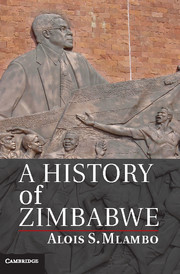Book contents
- Frontmatter
- Dedication
- Contents
- Figures
- Tables
- Maps
- Acknowledgements
- Timeline
- Notable Figures in Zimbabwean History
- 1 Introduction: Zimbabwe in Historical Perspective
- 2 Early States, c. 900–1900
- 3 The British Conquest State
- 4 Colonial Economy and Society to 1953
- 5 The Federation Years, 1953–1963
- 6 Nationalist Movements to 1965
- 7 Unilateral Declaration of Independence and African Response
- 8 Independent Zimbabwe, 1980–2000
- 9 The Crisis Years, 2000–2008
- 10 Conclusion: Zimbabwe Past, Present and Future Prospects
- Select Bibliography
- Index
- References
3 - The British Conquest State
Published online by Cambridge University Press: 05 June 2014
- Frontmatter
- Dedication
- Contents
- Figures
- Tables
- Maps
- Acknowledgements
- Timeline
- Notable Figures in Zimbabwean History
- 1 Introduction: Zimbabwe in Historical Perspective
- 2 Early States, c. 900–1900
- 3 The British Conquest State
- 4 Colonial Economy and Society to 1953
- 5 The Federation Years, 1953–1963
- 6 Nationalist Movements to 1965
- 7 Unilateral Declaration of Independence and African Response
- 8 Independent Zimbabwe, 1980–2000
- 9 The Crisis Years, 2000–2008
- 10 Conclusion: Zimbabwe Past, Present and Future Prospects
- Select Bibliography
- Index
- References
Summary
British colonialism destroyed the Ndebele state at the end of the nineteenth century. In 1890, a group of adventurers known as the Pioneer Column, sponsored by South African-based British arch-imperialist Cecil John Rhodes, occupied Zimbabwe and claimed the country for the British. British colonisation of Zimbabwe was part of nineteenth-century European expansionism in which European countries imposed political and economic control over territories in various parts of the globe. This was, in fact, the second wave of European imperialism and resulted in the African continent being carved up like the proverbial turkey and shared among the major European countries by the end of the century. The first wave occurred in the sixteenth century, following Christopher Columbus’s crossing of the Atlantic Ocean, which linked the New World of the Americas to Europe and paved the way for Spanish, British, French, Portuguese and other European countries’ acquisition of colonies in North and South America and the Caribbean. Sixteenth-century European imperialism ushered in the Transatlantic slave trade which was to see millions of Africans forcibly translocated to the Americas to work on sugar and cotton plantations and other sectors of the economy of the New World. Because of its distance from the sea, however, Zimbabwe was not directly affected by the Transatlantic slave trade.
In Africa, the speed with which European countries acquired territories was so rapid that it was a veritable scramble. In the 1870s, most of Africa was self-governing, with the exception of South Africa under the British and the Afrikaners, Algeria under the French, parts of North Africa under the Ottoman Empire, Mozambique and Angola under Portugal, and Lagos and Sierra Leone under the British. By 1910, the entire African continent was under European rule, except for Ethiopia and Liberia. The European grab for colonies was accelerated following the Berlin Conference of 1884, which brought together representatives of the European countries that were interested in acquiring territory in Africa to establish rules of engagement in the colonisation process (Maps 3.1 and 3.2).
- Type
- Chapter
- Information
- A History of Zimbabwe , pp. 30 - 51Publisher: Cambridge University PressPrint publication year: 2014

